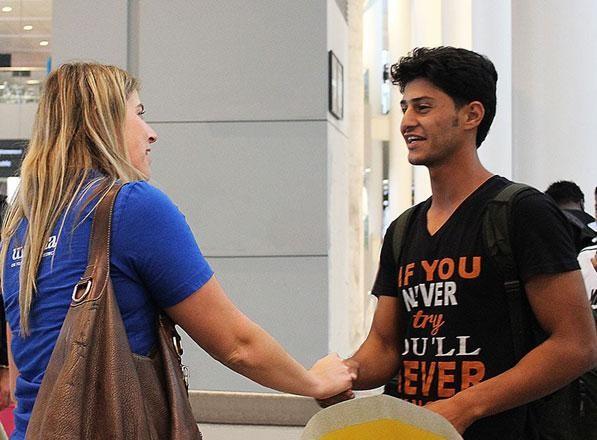
Refugee students resettle to Canada through solidarity programme
This year, the World University Service of Canada's (WUSC) Student Refugee Programme (SRP) received over 400 applications from students in Jordan and Lebanon, a reflection of the programme's success, WUSC Jordan country director, Niveen Bataineh, told The Jordan Times, adding 'we will be able to offer resettlement and access to academic institutions for a total of 50 students from Jordan and Lebanon combined'.
Launched in 1978 with the placement of the first student at Carleton University, the SRP is a one-of-a-kind programme that supports over 130 refugee students per year, combining resettlement with higher education opportunities, according to its vision statement.The programme recently expanded its outreach to the two Arab states in light of the Syrian crisis. 'In 2015, in response to the Syrian refugee crisis and following Canada's commitment to resettle larger numbers of Syrian refugees, we decided to scale up our resettlement efforts in the region,' Bataineh explained, noting 'many of our member universities and colleges were moved by the Syrian crisis, and so we were able to grow the programme to match increased spaces on campus'.
Highlighting the SRP's unique youth-to-youth sponsorship model, which empowers young Canadian students to play an active role in the sponsorship of refugee students, she said: 'Given that our numbers are limited to the funds raised by students on Canadian campuses, we were able to raise our resettlement cases based on the numbers of sponsorship spaces available.'The Student Refugee Programme is built around the campus-based local committees, which support the key aspects of refugees' sponsorship and integration, according to the WUSC official, who said 'our committees raise funds and awareness for the programme on their campus and in their community, while also playing a critical role in offering day-to-day social and academic support to SRP students'.
Students on Canadian campuses raise funds through a student levy system, which includes paying a small amount rolled into their student union fees. The amount varies by institution from 50 cents up to $5 per student per year, Bataineh explained, stressing 'this is a small amount for each student but the total gets pooled each year and helps cover refugee students' living expenses and fees for their first year in Canada.''Not only does this model foster greater integration for the sponsored student, it also provides an opportunity for Canadians to learn firsthand about newcomer integration,' the SRP website stressed, highlighting how 'over time, this unique model fosters greater cross-cultural understanding and contributes towards more welcoming communities'.
'Refugee students face some unique challenges when resettling: they are adjusting to the cross-cultural changes of life in Canada, and also adapting to the Canadian academic system at the same time. Their sponsors — other youth studying on the same campus — help them by providing much needed social support; they also help them connect to the relevant departments to help with their academic transition,' Bataineh highlighted.Through partnerships with over 80 Canadian campuses, the SRP has so far empowered over 1,800 young refugees from 39 countries over the last 40 years.
For WUSC local committee member at the University of Toronto Cyrus Silverstrider, 'the best part about this programme is the opportunity I get to glimpse the network of brilliant students that have come to study in Canada. I have had the chance to meet so many SRP students, and I have to say, I am humbled by the joy, positivity, and perseverance they all share'.A former SRP student, Alfred Orono Orono, said:'My experiences as a child soldier could have destroyed me, but instead fuelled a passion for championing human rights. After escaping my captors and spending two years in various refugee camps, I received the news that a group of young students at the University of Alberta were giving me a chance to pursue my post-secondary education.'
Now an international lawyer and human rights specialist, he continued: 'At a time where I felt powerless, I was given a chance for a better future for myself, my family and my community. I had the drive to survive the horrors that I had seen and lived as a child and teenager, and finally I had an opportunity to change the outcome of my life.'Applications for the programme are open to any recognised refugee aged between 17 and 25 who finished secondary school and is proficient in English or French.

Legal Disclaimer:
MENAFN provides the
information “as is” without warranty of any kind. We do not accept
any responsibility or liability for the accuracy, content, images,
videos, licenses, completeness, legality, or reliability of the information
contained in this article. If you have any complaints or copyright
issues related to this article, kindly contact the provider above.
















Comments
No comment